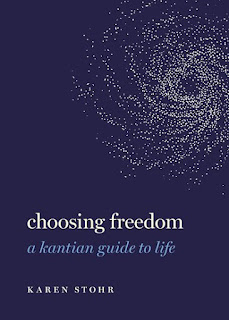 Scholar in the Kennedy Institute of Ethics. She publishes in the areas of Kantian ethics, Aristotelian virtue ethics, and contemporary ethical theory, focusing especially the relationship between moral norms and social norms. Her books include On Manners (2011) and Minding the Gap: Moral Ideals and Moral Improvement (2019). Her articles have appeared The New York Times and the Houston Chronicle, and she writes an ethics column for the Washingtonian.
Scholar in the Kennedy Institute of Ethics. She publishes in the areas of Kantian ethics, Aristotelian virtue ethics, and contemporary ethical theory, focusing especially the relationship between moral norms and social norms. Her books include On Manners (2011) and Minding the Gap: Moral Ideals and Moral Improvement (2019). Her articles have appeared The New York Times and the Houston Chronicle, and she writes an ethics column for the Washingtonian.
Stohr applied the “Page 99 Test” to her new book, Choosing Freedom: A Kantian Guide to Life, and reported the following:
The actual page 99 is pretty boring, as it merely introduces Part II of the book, a section called Moral Assessment. So instead I’ll tell you what’s on page 97, which is the last page of Chapter 9 and also the last page of Part I, called Kantian Basics. Since it’s not very long, I’ll just quote it:The Page 99 Test: Minding the Gap.I promise, we’re really almost finished! There’s one more kind of duty that is not an official category, but that shows up rather sneakily in a number of places in Kant’s ethics. This is what he calls a “duty to humanity as such.” What makes this an odd duty is that it is not a duty to a particular person. We might think of ‘humanity’ in this context as functioning like it does when we talk about crimes against humanity. A crime against humanity is often a crime against specific individuals. When we call something a crime against humanity, however, we generally mean something that is over and above the specific violations of duty toward those individuals. It’s a crime against the human race, past, present, and future. Kant’s duty to humanity as such seems to rely on a similar sense of humanity. It’s a duty that we owe to humanity over and above the duties that we owe to specific human beings. To keep things simple, I’m going to talk about the duty to humanity as such as a duty to the moral community, in the sense of the ethical commonwealth. This is not perfectly accurate, but it’s close enough for our purposes. And anyway, by this point you’re probably running out of mental space for additional distinctions.This page would give the browser a very good sense of the tone of my book, which aims to make Kant’s rather formidable moral theory both interesting and accessible to lay readers. It is the last page of a chapter in which I have just spelled out Kant’s complicated system of moral obligations. It is also the last page of Part I of the book, the goal of which is to set out the essential framework of Kant’s ethical thought. That’s why I’m congratulating the reader for having made it through that far. As for the content on page 97, it introduces a concept in Kant that is often (unfortunately) overlooked by his commentators, which is the concept of a moral obligation to humanity as a whole. Kant thinks that we should be doing our best to move humanity forward, both intellectually and morally. Essentially, we should aim to leave the world better than how we found it. As I discuss later in the book, this concept ends up being quite important to Kant’s ideas about things like respect, trust, self-development, and hope. So it’s a pretty useful page.
We now have quite an array of duties before us. You do not need to memorize them. There is no quiz at the end of the book. When we talk about specific duties in later chapters, I’ll remind you about where each of them fits into this overall schema. Still, you might find it helpful to refer back to this chapter once in a while to keep some of these duties straight in your head. And congratulations! You just survived Kantian duty boot camp!
Kant is certainly a famous philosopher, but he tends not to inspire much affection. In this book, I aim to introduce readers to a different side of Kant. The Kant in this book is someone who has insights into why self-knowledge is so hard, why we should avoid expressing the contempt for people that we sometimes feel, why truth-telling is so important in our relationships, why friendships cannot survive without reciprocity, why we are occasionally resentful when people do us favors, and why we should be careful about playing competitive games at dinner parties. A Kantian life is one dedicated to moral ideals like respect, self-respect, equality, dignity, and community. These are ideals we probably already have, but Kant can teach us how to make them more concrete in our daily lives. One of the things I find most appealing about Kant is that while he thinks that the world can be a very dark place, he also thinks that human beings are capable of making it much better. We are, he thinks, beings with extraordinary possibilities, if only we choose to see and act on them. Even in the darkest of times, we always have reason for hope in ourselves and in each other.
Learn more about Choosing Freedom at the Oxford University Press website, and visit Karen Stohr on Twitter.
--Marshal Zeringue



